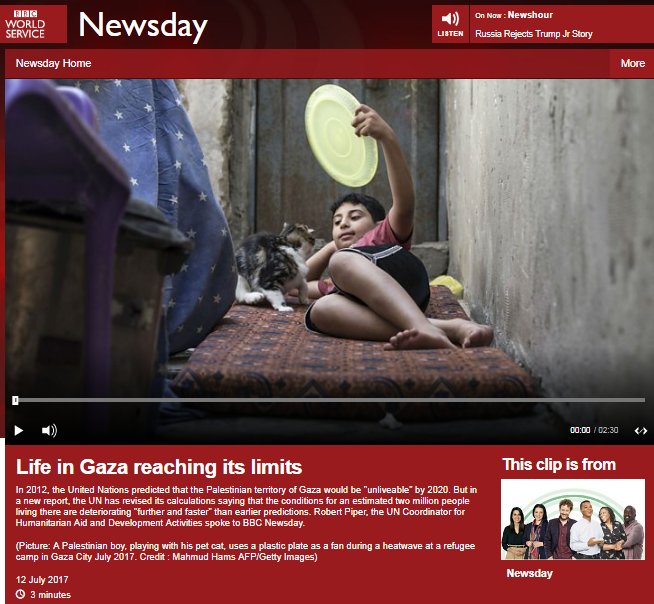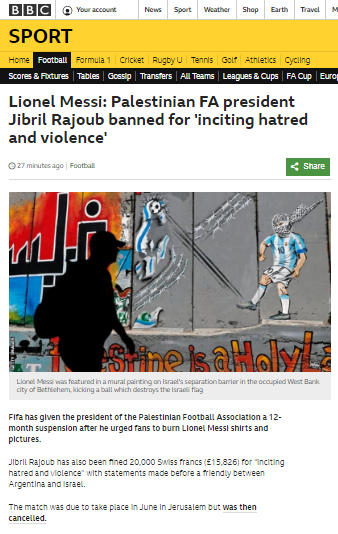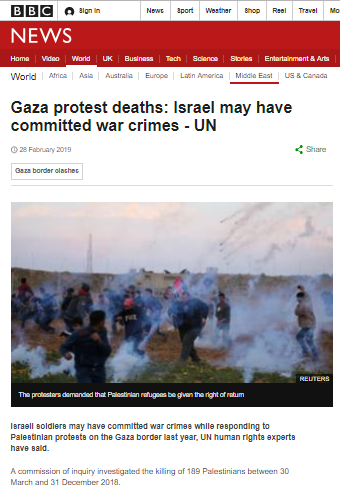On July 11th the United Nations released a report titled ‘Gaza Ten Years Later’ and in addition to publishing a press release on the topic, the head of the team that complied that UNSCO report also promoted it via interviews with various media outlets – including the BBC.
The early edition of the BBC World Service radio programme ‘Newsday‘ on July 12th included an interview (from 16:45 here) with Robert Piper – whose full job title is “UN Coordinator for Humanitarian Aid and Development Activities in the Occupied Palestinian Territory”. A clip from that interview was also promoted separately by the BBC on social media under the title “Life in Gaza reaching its limits” and with a synopsis reading:
“In 2012, the United Nations predicted that the Palestinian territory of Gaza would be “unliveable” [sic] by 2020. But in a new report, the UN has revised its calculations saying that the conditions for an estimated two million people living there are deteriorating “further and faster” than earlier predictions. Robert Piper, the UN Coordinator for Humanitarian Aid and Development Activities spoke to BBC Newsday.”
Presenter Alan Kasujja introduced the item as follows:
Kasujja: “Now let’s talk about Gaza. The living conditions of an estimated 2 million people in the Gaza Strip are deteriorating fast: further and faster than earlier predictions. So claims a new report from the United Nations which says its earlier estimation back in 2012 that Gaza would be unlivable by 2020 is wrong. Rather, Gazans have already reached their limits. And joining us now from Jerusalem is Robert Piper; the UN coordinator for the humanitarian aid and development activities. Thank you for joining us this morning. Can we just first of all start by establishing, Robert, what you mean when you say that it’s unlivable.”
Piper: “…I think essentially the conditions have deteriorated to such a degree across a number of fields that really life is increasingly untenable for Gazans in terms of access to electricity, in terms of access to reliable drinking water, in terms of prospects for jobs. Down each of these avenues, if you will, Gazans are seeing less and less possibilities.”
Kasujja: “Very interested in hearing what life is like on an ordinary day for Gazans. You talk about access to electricity; could you paint a picture for us to illustrate that?”
Piper: “Well the electricity situation in the last few months has got so serious that in the last 10 days it got down to 2 to 3 hours a day for most Gazan households. Let’s remember Gaza is a hugely dense population. It’s not far off Hong Kong in terms of population density so it’s a lot of high-rise buildings; a lot of people living over the 4th, 5th, 6th floor and onwards in high-rise buildings. Because of the electricity crisis, 2 to 3 hours a day means if you’re in this high-rise building your elevator is probably not working more than a few minutes a day in a kind of organised way. The water pressure is so low because of the electricity shortages that the actual water is not coming out of the…is not reaching floors above the 3rd floor of these buildings. If you are an elderly person say living on the 10th floor of that building, you don’t have your elevator reliably, you don’t have reliable access to water. But energy also hits so many other sectors. It hits the health sector very severely, so in hospitals…”
Kasujja: “Because of the sanitation issues, I imagine.”
Piper: “Well firstly the hospitals are so short of electricity that they’re not using their diagnostic equipment very often because it’s very energy intensive. But indeed, in a broader sense as well. Water treatment is now basically zero so pollution is going…untreated water is going straight into the Mediterranean every day; about 100,000 cubic meters. So across the board – health, water supply, sanitation services and the wider economy – having to pay diesel to turn a generator on to irrigate your farm fields means that the cost of vegetables and so forth, everything is creeping up and of course…”
Following that description of the situation, the conversation then turns to the subject of its cause. Of course as regular readers well know, the exacerbated electricity crisis in the Gaza Strip – with all its various knock-on effects such as sewage treatment – has nothing to do with Israel but is the result of a long-standing dispute between Hamas and the Palestinian Authority, both of which could solve the crisis if they so desired. As Robert Piper’s report shows, he knows that too but nevertheless, BBC audiences around the world are not informed of the real background to this story.
Kasujja: “So how do you change all this? How do you turn this around?”
Piper: “Well for us this is a 10 year trend. I think the latest crisis in Gaza around energy for us is just a wake-up call of the long-term chronic issues that have been building over 10 years. It is a function…for us really trying to make an appeal to all of the actors involved. To put people back at the centre of their policy considerations…”
Kasujja: “Actors involved including who? Because, for example, the Hamas are not considered partners by Israel.”
Piper: “Well indeed this is a 10 year…this is a 10 year report and it recognizes three events about 10 years ago. First is the violent take-over by Hamas of the Gaza Strip and Hamas is now the de facto authority in Gaza. Secondly, the increasingly tough closures that are effectively a blockade that Israel placed around Gaza. And thirdly, the ejection of the Palestinian Authority from the Gaza Strip by Hamas and division that followed in the sort of governance of Palestine. So we had these three events each of which have, you know, between them I should say has really had devastating consequences. So when you talk about who we’re speaking to, it’s all of these three but it’s also the international community, of course, which plays a very important role in Gaza.” [emphasis added]
Notably, Piper’s report specifically states (on page 8) that the counter-terrorism measures introduced by Israel after the violent Hamas coup in the Gaza Strip and the subsequent rise in missile attacks have been eased since they were first implemented. Whether or not Kasujja had actually read the report before this interview took place we do not know, but he neither challenges Piper on that false claim of “increasingly tough closures” nor bothers to inform listeners of the Hamas terrorism that is the reason why such measures had to be implemented in the first place.
Kasujja: “Is there still an appetite in trying to resolve these problems in Gaza because possible you [unintelligible] paint a very political problem because I get the sense that they need to sort out the politics first before any meaningful humanitarian work is done and the question then becomes whether there’s an appetite for that in the international community; for that sort of engagement by the international community.”
Piper: “Well I think firstly I have a problem with the sequence of events. We can’t put the humanitarian after the politics. This picture that we paint for 2 million Gazans is really an increasingly desperate, desperate picture in terms of all of these issues: access to water, to energy, to jobs. The economy is going backwards. Really I think you…our appeal above all is to say firstly let’s…let’s put people first and let’s look at some of the strategies and policies that are being deployed by Israel, by the Palestinian Authority, even by Hamas, in terms of whether they are indeed protecting the interests of civilians or not. That has got to be a starting point. That has got to come before politics in our opinion.”
Kasujja: “Really good to talk to you and thank you very much for your time, Robert Piper. Robert is from the UN. He coordinates humanitarian aid and development activities.”
The programme’s second presenter, Julian Keane, then added:
Keane: “Interesting to hear an answer: daily life in Gaza – which so often is in the headlines.”
Obviously BBC World Service listeners did not “hear an answer” at all. The word terrorism did not appear once in this item and no background information was provided concerning topics such as the missile attacks or cross-border attack tunnels that are the reason for the restrictions on movement and access introduced by Israel.
Neither were audiences given a true picture of the real cause of the electricity crisis in the Gaza Strip. Instead, uninformed listeners were steered towards the erroneous understanding that Israeli counter-terrorism measures play some part in the fact that ordinary people in Gaza only have two or three hours of electricity a day. Listeners, however, heard nothing at all about Egypt’s implementation of similar measures on its border with the Gaza Strip or its destruction of the tunnels in Rafah through which cheap fuel was once smuggled.
It is very obvious that this was not a news item at all but merely the BBC’s uncritical contribution to a PR campaign promoting a UN report that relies heavily on political NGOs and previous partisan UN reports.
Related Articles:
More BBC disinformation on Gaza power crisis
BBC News parrots inaccurate claim from a politicised UN agency
BBC’s Knell reports on Gaza power crisis – without the usual distractions
BBC bows out of coverage of 10 years of Hamas rule in Gaza




